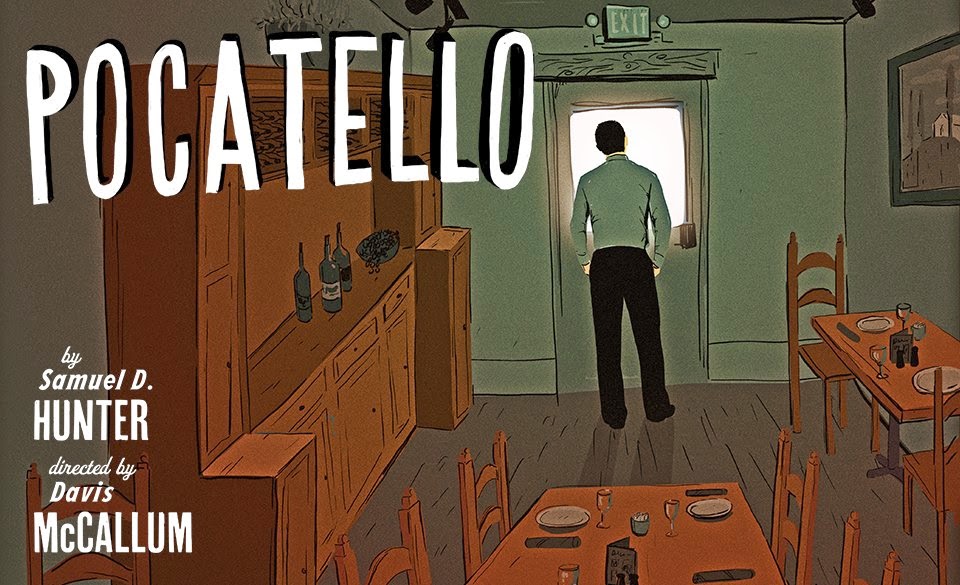Pocatello
"Maybe we just don't get to be happy," a despondent Tammy says toward the end of Samuel D. Hunter's new play, Pocatello, now playing at Playwrights Horizons. It's a realization that hangs over the characters and just might find its way into your head, leaving you depressed as you walk out of the theatre and back into the rain, broken umbrella in hand. (Was that just me?)
Hunter sets his play (directed by Davis McCallum) in a foundering chain restaurant (akin to Olive Garden) in Pocatello, Idaho. Eddie (T.R. Knight) is the restaurant's manager, and he's struggling to connect with...anyone, really. There's his mother, Doris (an aloof Brenda Wehle); his visiting brother and sister-in-law, Nick and Kelly (Brian Hutchison and Crystal Finn, respectively); and his staff, Max (Cameron Scoggins), Isabelle (Elvy Yost) and Troy (Danny Wolohan).
Trying to make a connection—any connection—with his own family, Eddie organizes "Famiglia Week," and in doing so, he opens the door for other families' troubles. This means we get to meet Troy's wife, the aforementioned Tammy (a deeply affecting Jessica Dickey), their daughter, Becky (Leah Karpel), and his father, Cole (Jonathan Hogan).
The dynamic in that family, especially between Troy and Tammy, was what I found most interesting and compelling. The couple has been together (and in the same small, sleepy town) since high school; their daughter is in a typically rebellious and defiant phase; Cole is, it appears, in the early stages of Alzheimer's; and Tammy is a recovering alcoholic. No one in that family is happy, which is what makes Tammy's realization all the more poignant and satisfying.
But Troy and Tammy are tangents; Eddie is our protagonist, even if he can be difficult to root for. Eddie does not speak up for himself. He does not ask for or demand what he wants. Instead, he tries to please everyone around him and nudge them in the direction of connection.
Playwright Hunter colors Eddie with seemingly minute details that speak volumes about where Eddie is, existentially speaking. For example, when talking to his brother, Eddie mentions his apartment and his apartment complex. In my mind, the thought of this nearing-middle-age, single, gay man who's the manager of an about-to-close chain restaurant living in some drab apartment complex marks Eddies as truly pathetic. Maybe it's because I'm a city gal, but when I think of people living in the suburbs (or non-metropolitan areas, like Pocatello), I think of people living in their own homes. Sure, if you're a college student or recent graduate you might live in an apartment. Or, if you're elderly you might live in a seniors complex. But to be a 30-something in that situation...it just sticks with me as a talisman of Eddie's sad existence, which makes it obvious that he would be yearning for connection.
Eddie's desperation is discomfiting for everyone, Pocatello characters and audiences alike. That might be OK, though. As some in Pocatello learn, not everything turns out the way you hoped it would, but that's life.
Hunter sets his play (directed by Davis McCallum) in a foundering chain restaurant (akin to Olive Garden) in Pocatello, Idaho. Eddie (T.R. Knight) is the restaurant's manager, and he's struggling to connect with...anyone, really. There's his mother, Doris (an aloof Brenda Wehle); his visiting brother and sister-in-law, Nick and Kelly (Brian Hutchison and Crystal Finn, respectively); and his staff, Max (Cameron Scoggins), Isabelle (Elvy Yost) and Troy (Danny Wolohan).
Trying to make a connection—any connection—with his own family, Eddie organizes "Famiglia Week," and in doing so, he opens the door for other families' troubles. This means we get to meet Troy's wife, the aforementioned Tammy (a deeply affecting Jessica Dickey), their daughter, Becky (Leah Karpel), and his father, Cole (Jonathan Hogan).
The dynamic in that family, especially between Troy and Tammy, was what I found most interesting and compelling. The couple has been together (and in the same small, sleepy town) since high school; their daughter is in a typically rebellious and defiant phase; Cole is, it appears, in the early stages of Alzheimer's; and Tammy is a recovering alcoholic. No one in that family is happy, which is what makes Tammy's realization all the more poignant and satisfying.
But Troy and Tammy are tangents; Eddie is our protagonist, even if he can be difficult to root for. Eddie does not speak up for himself. He does not ask for or demand what he wants. Instead, he tries to please everyone around him and nudge them in the direction of connection.
Playwright Hunter colors Eddie with seemingly minute details that speak volumes about where Eddie is, existentially speaking. For example, when talking to his brother, Eddie mentions his apartment and his apartment complex. In my mind, the thought of this nearing-middle-age, single, gay man who's the manager of an about-to-close chain restaurant living in some drab apartment complex marks Eddies as truly pathetic. Maybe it's because I'm a city gal, but when I think of people living in the suburbs (or non-metropolitan areas, like Pocatello), I think of people living in their own homes. Sure, if you're a college student or recent graduate you might live in an apartment. Or, if you're elderly you might live in a seniors complex. But to be a 30-something in that situation...it just sticks with me as a talisman of Eddie's sad existence, which makes it obvious that he would be yearning for connection.
Eddie's desperation is discomfiting for everyone, Pocatello characters and audiences alike. That might be OK, though. As some in Pocatello learn, not everything turns out the way you hoped it would, but that's life.

We loved this show. Yes... it's a story that's been told before... All stories have been told before. This context and players are another instance and the show stands to remind us of the "quiet desperation". The players are competent. I recommend the show if you can still get to see it.
ReplyDeleteMarlene
PicCell